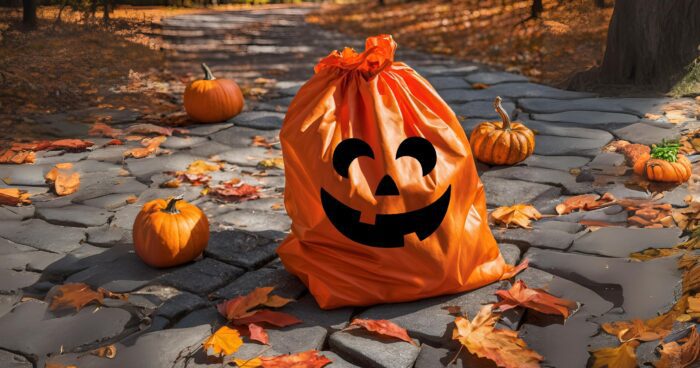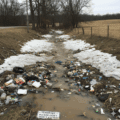
Pollution is scarier than you think. Knowing the facts about littering is step one to becoming part of the solution. It’s a serious environmental issue that affects wildlife, waterways, and our communities. Every piece of trash discarded improperly contributes to a growing problem in Tennessee, and knowing the facts about litter can help us all become part of the solution.
Learn the Facts About Litter and Be Part of the Solution
The good news is that solving the litter problem starts with something as simple as awareness. By learning key facts about litter, you can become part of the solution and help put an end to this growing issue. WithHalloween is just around the corner, let’s dive into 10 spooky facts about litter that may surprise—and even scare—you:
1. Cigarette Butts Take a LONG Time to Decompose
Did you know that cigarette butts can take up to 10 years to decompose? They also release harmful toxins into the environment. To help combat this issue, always use designated receptacles for cigarette disposal, and consider carrying a portable ashtray if you’re outdoors. Educating fellow smokers about the environmental impact of littering cigarette butts can also make a difference.
2. Waterway Trash Often Comes from Land-Based Activities
Your trash can end up in many different places. The trash that ends up in oceans and waterways gets there by traveling through streams, rivers, stormwater conveyances and even via wind and rain. To minimize the chances of your waste contributing to this problem, always secure your trash bins with tight-fitting lids and avoid overfilling them.
3. Wildlife Life Can Mistakenly Eat Trash
Many different species of animals can ingest or become entangled in debris. In fact, approximately 558 species of wildlife and fish have been affected by trash. To help protect these vulnerable creatures, make it a habit to properly dispose of your waste and encourage others to do the same.
4. Waterway Trash Can Affect Fish Populations
Pollution in the oceans and waterways can significantly reduce the fishing population, which hurts tourism and communities that rely on fisheries for our food supply. To help protect our aquatic ecosystems, be mindful of your own water usage and disposal practices—never pour chemicals or hazardous substances down the drain, as these can easily end up in our oceans.
5. Plastic Waste Can Break Down and Cause More Harm
Plastic can break down into smaller pieces, known as “microplastics.” These microplastics can create negative impacts on health for both humans and animals alike. To help combat this issue, consider reducing your use of single-use plastics by opting for alternatives like cloth bags, stainless steel containers, and glass bottles.
6. Each Person Can Contribute to a Whole Lot of Trash
An estimated 152 pieces of trash can be attributed to each person in the United States. While that number may seem alarming, there’s good news: a significant portion of that waste can be reduced through small, everyday changes like recycling, properly disposing of trash, and participating in community cleanups.
7. The Roadways are Filled with Trash
Our scenic byways have a big trash problem. According to TDOT’s 2022 visible litter study, there are 88 million pieces of litter on the state’s roadways at any given time. But there’s a way we can all help reduce this staggering number: Adopt-A-Highway programs allow individuals and groups to take ownership of specific stretches of road, where they commit to regular cleanups. These efforts, along with reporting litter violations and spreading awareness about proper disposal methods, can significantly cut down on roadside waste.
8. Litter Can Cause Severe Roadway Accidents
Not only does debris in the road cause a dangerous situation but that banana peel you throw out is a hazard too. When food waste is littered by a vehicle, it attracts animals to the road. They in turn can get into traffic and get injured, killed and/or damage your car. To avoid this, always dispose of food waste in proper trash bins rather than throwing it out the window. A simple habit of keeping a small trash bag in your car can help keep roads safe for both animals and motorists.
9. Our Drinking Containers Can Take a Long Time to Break Down
While aluminum cans take 200 years to decompose, a single plastic water bottle can take 450 years to break down. This long-lasting waste has a significant environmental impact, but you can help reduce it by switching to reusable water bottles and containers. Carrying a refillable bottle not only cuts down on plastic waste but also saves money and helps protect our planet for future generations.
10. Cleaning Up Litter and Waste Can Be Expensive
The Tennessee Department of Transportation spends over 35 million dollars annually on litter pickup and prevention education. While this investment is crucial for maintaining our beautiful landscapes, we can all do our part to reduce these costs. One simple way to help is to organize or participate in local cleanup events in your community. Not only do these activities help keep our roads and parks clean, but they also foster a sense of community and raise awareness about the importance of keeping our environment litter-free.
Know the Facts About Litter and Make a Difference
Ending The Litter Problem Starts With YOU. The good news is that there are simple steps each of us can take to reduce litter. By understanding the facts about litter, you’re already on the right path. Start by always properly disposing of your trash and participating in community cleanups. Reducing single-use plastics, recycling, and spreading awareness about litter’s dangers are other ways to contribute to cleaner and healthier communities.
Are you ready to Be Part of the Solution? Let’s keep Tennessee beautiful together! You can help by joining a litter cleanup near you.
Sources






